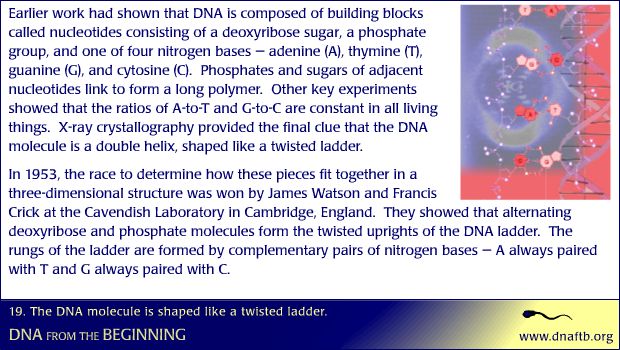Concept 19: The DNA molecule is shaped like a twisted ladder.

Deoxyribose and phosphate molecules form the uprights and nucleotide pair form the rungs of the DNA ladder.
Earlier work had shown that DNA is composed of building blocks called nucleotides consisting of a deoxyribose sugar, a phosphate group, and one of four nitrogen bases — adenine (A), thymine (T), guanine (G), and cytosine (C). Phosphates and sugars of adjacent nucleotides link to form a long polymer. Other key experiments showed that the ratios of A-to-T and G-to-C are constant in all living things. X-ray crystallography provided the final clue that the DNA molecule is a double helix, shaped like a twisted ladder. In 1953, the race to determine how these pieces fit together in a three-dimensional structure was won by James Watson and Francis Crick at the Cavendish Laboratory in Cambridge, England. They showed that alternating deoxyribose and phosphate molecules form the twisted uprights of the DNA ladder. The rungs of the ladder are formed by complementary pairs of nitrogen bases — A always paired with T and G always paired with C.
james watson and francis crick, x ray crystallography, deoxyribose sugar, dna ladder, dna molecule, phosphate group, francis crick, double helix, cytosine, thymine, dimensional structure, building blocks, nucleotide, phosphates, uprights
- ID: 16421
- Source: DNALC.DNAFTB
Related Content
16422. Animation 19: The DNA molecule is shaped like a twisted ladder.
James Watson and Francis Crick explain how they solved the structure of DNA. Erwin Chargaff explain how he measured the levels of each of the four nitrogenous bases.
15676. DNA helix
Image depicting DNA helix model and table.
15493. The double helical structure of DNA, 3D animation with no audio
Animation of 2D DNA model becoming three dimensional.
1445. DNA
Because it contains the directions for assembling the components of the cell, DNA is often thought of as the "instruction book" for assembling life.
15539. DNA base pairs
DNA base pairs
15015. Francis Crick and James Watson in Cambridge.
1953 picture of Francis Crick (L) and James Watson (R) walking along the backs of King's College in Cambridge.
16022. James Watson and Francis Crick, 1953
The DNA molecule is shaped like a twisted ladder.
15492. Discovering the double helix structure of DNA, James Watson, video with 3D animation and narration
James Watson used cardboard cutouts representing the shapes of the DNA bases to figure out how bases pair.
15543. James Watson and Francis Crick
James Watson and Francis Crick, Cambridge University, 1953
15455. Winning the race for the double helix, James Watson
James Watson talks about his partnership with Francis Crick.












